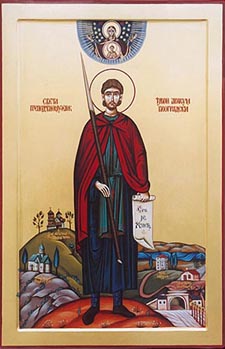Holy New Martyrs Paisius and Avakum, in Trnava near Cacak, Serbia
 After the collapse of Karageorge’s revolt in 1813, the Turks began a reign of terror against the Serbs. Disease also swept the area because of the many bodies left unburied. The people attempted another revolt under Hadj-Prodan Gligorijevic, and the monks of Trnava became involved in it. The rebellion took place on the Feast of the Cross (September 14), but it was crushed by the Turks. Many people were captured, and some were executed on the spot as a warning to others.
After the collapse of Karageorge’s revolt in 1813, the Turks began a reign of terror against the Serbs. Disease also swept the area because of the many bodies left unburied. The people attempted another revolt under Hadj-Prodan Gligorijevic, and the monks of Trnava became involved in it. The rebellion took place on the Feast of the Cross (September 14), but it was crushed by the Turks. Many people were captured, and some were executed on the spot as a warning to others.
Some of the prisoners were sent to Suleiman Pasha in Belgrade, among whom were Sts Paisius and Avakum. The holy deacon Avakum sang “God is with us” (from Compline) in the prison cell, while St Paisius prayed. The Turks offered to free anyone who would convert to Islam. Some of the prisoners agreed to this, but the majority refused to deny Christ, and so they were put to death.
St Paisius was taken from prison and forced to carry a stake to the place of execution. He was impaled, and the stake was set into the ground. The holy martyr exclaimed, “Glory to God.” Then the vizier clapped his hands to signal his soldiers to draw their swords and begin killing some of the other prisoners. Forty-eight people were killed, and their bodies were raised up on posts. After suffering for some time, St Paisius surrendered his soul to God, thereby obtaining the crown of martyrdom on December 17, 1814.
The Turks tried to pressure Avakum to save himself by embracing their religion, but he refused even to consider it. His former spiritual Father, Gennadius, accepted the offer of the Turks and urged Avakum to follow his example. The courageous deacon declared that he was a warrior of Christ, and preferred to die rather than deny Christ.
St Avakum was sentenced to be impaled on a stake, which he was forced to carry to the place of execution. His own mother urged him to embrace Islam, then to seek forgiveness later because he had been forced into it. The saint thanked her for giving him life, but not for her advice.
At the place of execution, the Turks asked him one more time to consider his youth and not to die before his time. Avakum laughed and asked, “Don’t even Turks eventually die?”
They replied, “Of course they do.”“Well then,” he said, “the sooner I die, the fewer sins I will have.”
Because of his courage and steadfastness in his faith, the Turks decided not to impale him. They killed him quickly by stabbing him in the heart with a sword on January 27, 1815.
(Prepared by Fr. S. Jockovic)

